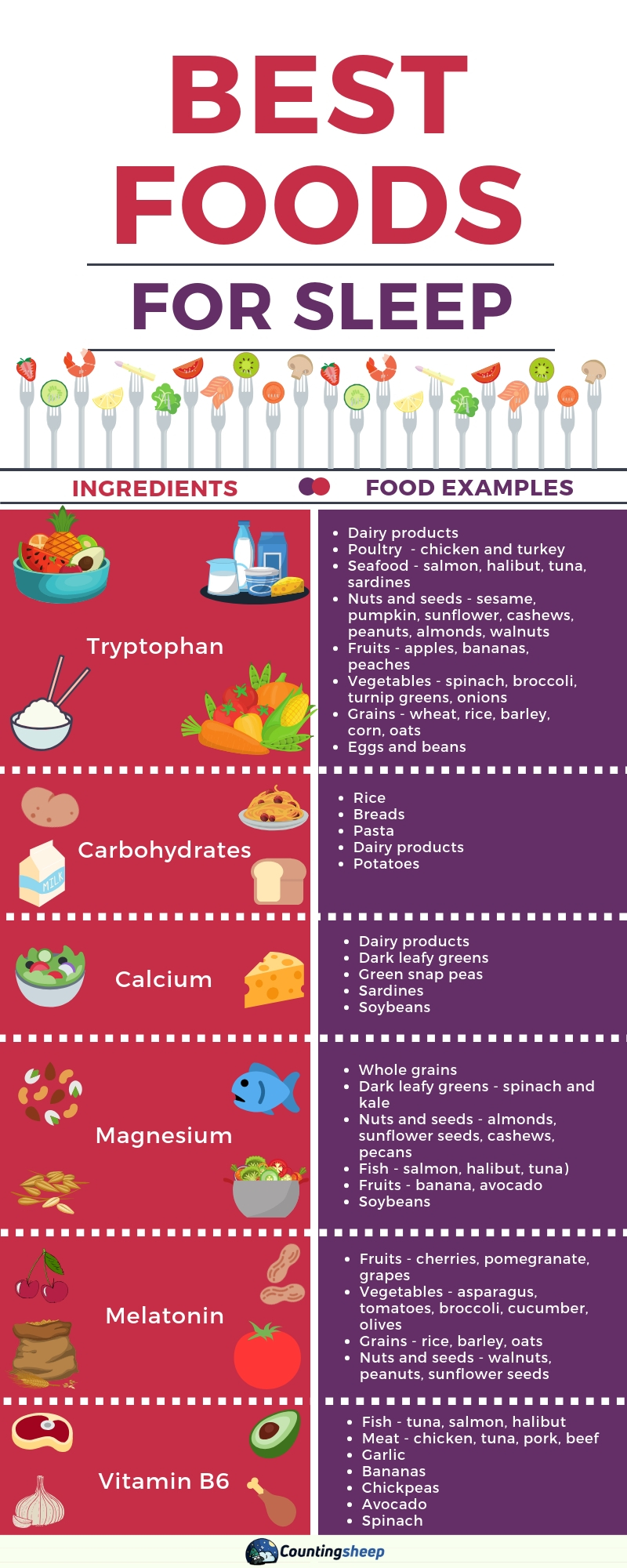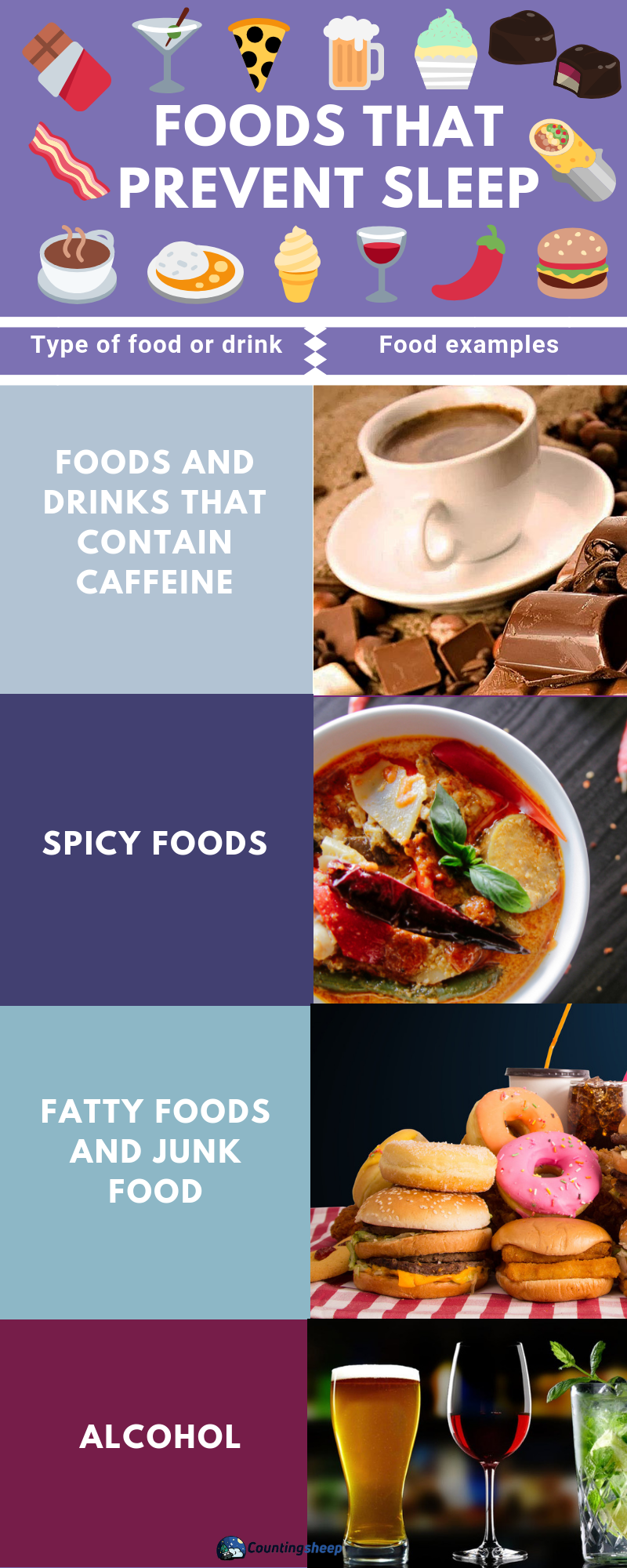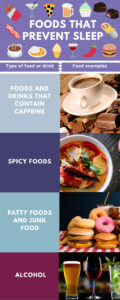The List of Best Foods for Sleep
Sleep Related Was this post helpful? Let us know if you liked the post. That’s the only way we can improve. Yes 9 No 3
Sleep Related Was this post helpful? Let us know if you liked the post. That’s the only way we can improve. Yes 9 No 3
Improving the quality of your sleep involves more than just simple changes like setting a consistent bedtime, creating a cozy sleep environment, and limiting naps during the day. To genuinely enhance your sleep and develop good sleep habits, a significant lifestyle overhaul is often necessary. Beyond quick fixes like minimizing screen time before sleep, integrating certain core habits into your daily life takes time and persistence to see benefits. Among these, the food and nutrients you consume play a pivotal role. Our research shows that dietary choices are one of the most overlooked yet critical elements of sleep hygiene. However, embracing a healthy diet can greatly improve your sleep quality.
We are well aware that food provides almost everything we need to live a happy, healthy and productive life. Eating certain foods can give us energy, strengthen our immune system, enhance our cognitive functions, make our bones stronger, heal wounds, and much more. Still, when it comes to sleep, we rarely think about the importance of healthy eating. Food can have amazing benefits in helping you fall asleep and wake up refreshed every day. However, you should also be aware that some foods can disrupt your sleep. Below is a list of the best and worst foods for sleep, as well as some useful dietary considerations you should implement if you struggle with acid reflux disease and insomnia.
In food, you can find four main vitamins and minerals that promote better sleep. These vitamin and minerals are tryptophan, magnesium, calcium, vitamin B6, carbohydrates and melatonin. Some vitamins and minerals that can be found in food help the body to produce melatonin, a neurotransmitter that regulates your sleep and wake patterns. In the evening, or close to bedtime, melatonin production increases and signalizes your body and brain that it’s time for sleep. In the morning, melatonin production naturally decreases, signalizing your mind that it’s time to wake up. Although most of the vitamins and minerals we mentioned are available as OTC supplements, it’s much better and more effective to get them from the foods you eat.

Tryptophan is an amino acid that is a natural precursor to the neurotransmitter serotonin. Serotonin is later converted to melatonin, a neurotransmitter vital for regulating sleep. The most significant source of tryptophan is dairy products, eggs, poultry, and seafood. Since most proteins are rich in tryptophan, they should be easy to remember. If you are wondering what to eat at night when hungry, these are always a good choice for a bedtime snack. Foods rich in tryptophan (protein) are also one of the best foods to eat at night for weight loss.
Carbohydrates promote better sleep because they facilitate the production of tryptophan. Studies show that pairing carbohydrates with a healthy fat can make you sleepy. Research published in the American Journal of Clinical Nutrition indicates that carbohydrate-rich foods with a high glycemic index make you fall asleep faster. Carbohydrates are mostly found in bread, rice, pasta, and potatoes.
Calcium not only helps you fall asleep faster but also helps you to stay asleep. This mineral promotes better sleep by assisting the brain in making melatonin. A lack of calcium can cause you to wake in the middle of the night and experience difficulties returning to sleep. Calcium-rich diets can help you alleviate the symptoms of insomnia. This mineral isn’t exclusive to dairy products, and can also be found in dark leafy greens. Dairy products are considered one of the best sleep inducers because they contain both tryptophan and calcium.
Magnesium is a very powerful mineral that is a natural relaxant and helps to deactivate adrenaline. Since it has a relaxing effect on your body and mind, it can help us to unwind and fall asleep faster. A lack of magnesium may cause both sleep onset and sleep maintenance insomnia. High sources or magnesium are also considered one of the best anti insomnia food and they can be found in foods such as dark leafy greens, nuts and seeds, avocado, fish and wheat germ.
Melatonin functions both as a hormone and a neurotransmitter. The pineal gland produces it, and it’s naturally regulated by light. Our body naturally produces melatonin, but it can also be found in many foods. What foods are high in melatonin? Mostly fruits and vegetables, grains, nuts and seeds.
According to a study published in the Journal of Medicinal Food, cherries are best fruit to eat before bed. Drinking 1 cup of tart cherry juice twice a day can reduce insomnia. Some studies also indicated that consuming walnuts may increase the overall levels of melatonin in your blood.
Simply put, it helps the body to create neurotransmitters that further help the body to produce melatonin. Lack of vitamin B6 can lower the levels of serotonin in the body, and as a consequence, cause insomnia or other sleep disruptions. Highest sources of B6 are found in mean and fish, sunflower seeds, pistachio nuts, and fruits. One of the many uses of avocados is to induce sleep. Apart from avocado, bananas can also help you fall asleep.
Apart from food, certain beverages can help you snooze better and without experiencing any disruptions. How to get to sleep when you can’t? The following drinks contain essential vitamins and minerals that promote better shuteye.
– Warm milk
– Almond milk
– Valerian tea
– Chamomile tea
– Tart cherry juice
– Passion fruit tea
– Peppermint tea
When you were a kid, your mother probably gave you a glass of warm milk before bed to help you sleep better. Although this may sound like old wives’ tale, it’s not. Studies have shown that drinking milk before bed can really help you snooze better because milk is rich in tryptophan and calcium. While tryptophan helps you to fall asleep, calcium makes sure you stay asleep during the entire night. The mere routine of drinking milk before bed also has an effect, because, over time, your brain starts associating this activity with sleep. Milk is the ultimate food for deep sleep. A warm cup of tea can also help to relax you and induce sleep.
Just as some foods and drinks can help you to sleep better, there are also foods and beverages you need to avoid before bedtime because they may rob you of sleep. Many of the foods that are on our list of foods that prevent sleep are healthy for you to eat, but are not recommended to be consumed before bed because they can disrupt sleep.


Coffee and energy drinks can give you a boost of energy when you are really feeling tired. However, since caffeinated beverages keep your mind active, you should avoid them after lunch and especially near bedtime. Foods such as dark chocolate are also high in caffeine and should be avoided late in the day.
Spicy food is very healthy and often delicious, but eating it close to bedtime is not a good idea because it may cause indigestion, heartburn and acid reflux. Heartburn gets even worse when you are lying down. Researchers believe that spicy food disrupts sleep because it contains capsaicin (typically found in chili peppers) that increases your internal body temperature. In order to fall asleep, your body temperature needs to be a bit lower than normal. Spicy foods also contain more fat which makes it harder for your body to process. Due to this, your body will focus on digestion instead of helping your brain to fall asleep.
Many people believe that alcohol can help you to fall asleep by making you feel drowsy. There are no alcoholic drinks that can help you sleep. However, although it can make you feel drowsy, and even if you fall asleep faster than usual, alcohol disrupts sleep, and it may prevent you from entering the deep stage of sleep.
Foods that are high in fat can disrupt sleep and your circadian rhythm. Researchers explain that a high fat diet disrupts the levels of orexin in your body, one of the neurotransmitters that help regulate your sleep and wake cycle. As a result, you will be sleepier during the day and hungrier at night. Consuming too many foods that are high in saturated fat may cause poor, fragmented sleep. Fat, apart from triggering digestion, also builds up the stomach acids, causing heartburn or acid reflux. Foods high in protein can disrupt sleep in the same manner as fatty foods.
Junk food will not only cause weight gain but may also disturb your sleep. Although these are the foods that make you sleepy after lunch, it doesn’t mean it can induce a healthy sleep. When you eat too much junk food or sugary desserts, your digestive system will not just spend the entire night breaking it down but over time, those foods will trigger late-night cravings.
Even if your diet is balanced and healthy, you should always avoid heavy meals close to bedtime. If you feel hungry close to bedtime, it is best to get a light snack such as a bowl of cereal, cheese, and crackers, or peanut butter on toast. These foods will induce sleep because they are rich in tryptophan and calcium. Apart from avoiding heavy meals, you should also avoid foods that contain water as well as drinking too much fluid close to bedtime. Watermelon and celery are natural diuretics, and consuming them before bedtime will lead to multiple unwanted bathroom trips.
Symptoms of GERD usually worsen during the night. Acid reflux occurs when the stomach acid splashes back into your throat, causing heartburn, nighttime asthma, and difficulty swallowing. Lying down in bed with a full stomach will make things even worse. To alleviate the symptoms of GERD, apart from adjusting your sleeping position, you should also change your diet. For example, the largest meal you eat during the day should be at lunchtime, and you mustn’t eat at least 3 hours before bedtime. Caffeine, alcohol, and hot spices are foods that can trigger acid reflux symptoms and should definitely be avoided.
If you have troubles falling asleep, or staying asleep at night, you have to cut down on all foods and drinks that may disturb sleep. It’s important to avoid caffeine, alcohol, sugary and junk food particularly. Your dinner should be light and made of foods that are rich in carbohydrates and tryptophan. For example, eat a bowl of cereal, some yogurt or drink a warm glass of milk with honey. These light snacks should relax you and help you fall asleep, especially if they become a regular part of your bedtime routine. For proper sleep, it is best not to eat at least 3 hours before bedtime. It’s never a good idea to go to bed with a full stomach, especially if you have insomnia or other sleep issues.
If you practice good sleep hygiene and follow the recommended eating tips, but still experience sleep problems, you could be suffering from a sleep disorder. In this case, it is best to visit your physician or contact a sleep center to help you.
Co-founder of Counting Sheep and Sleepaholic